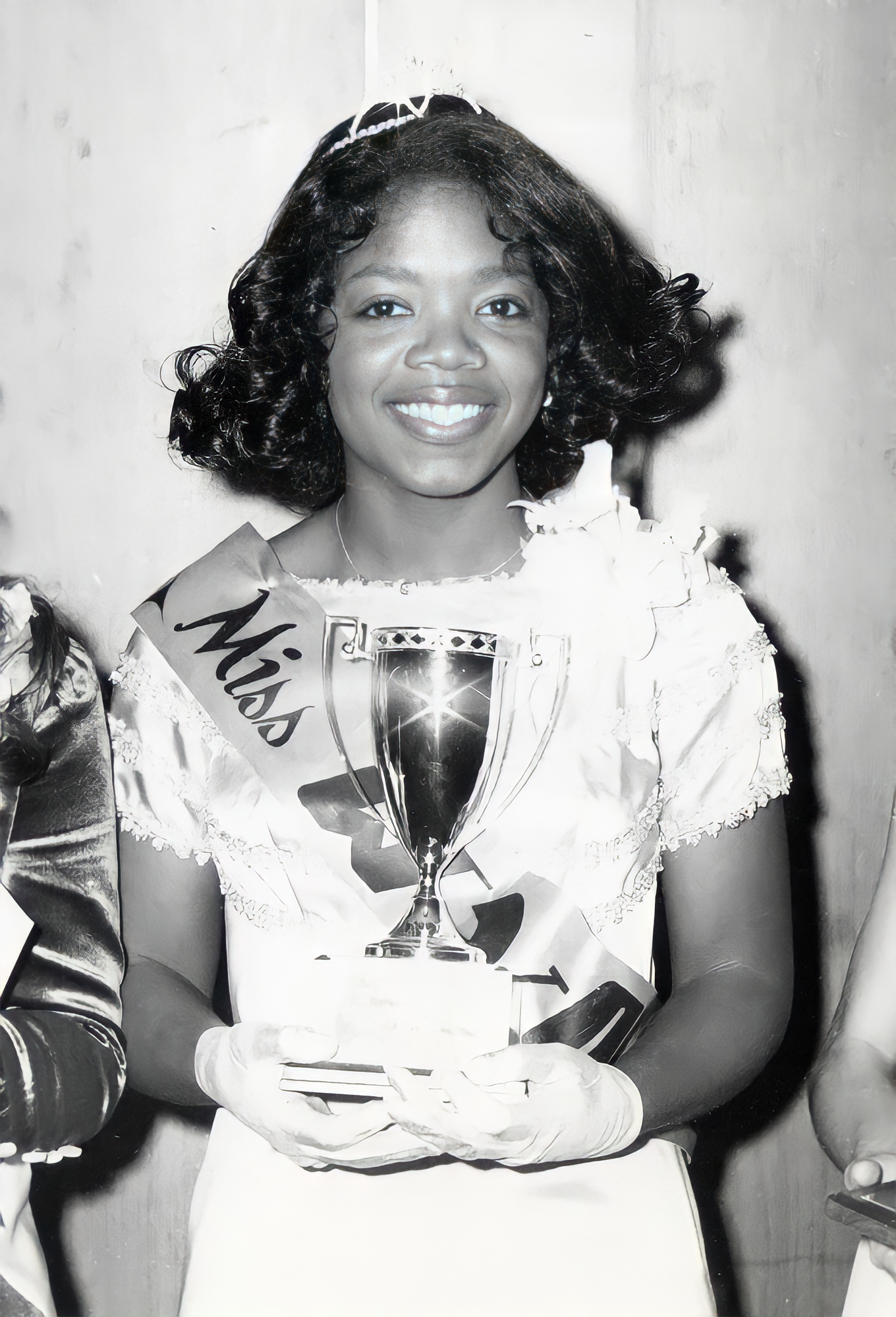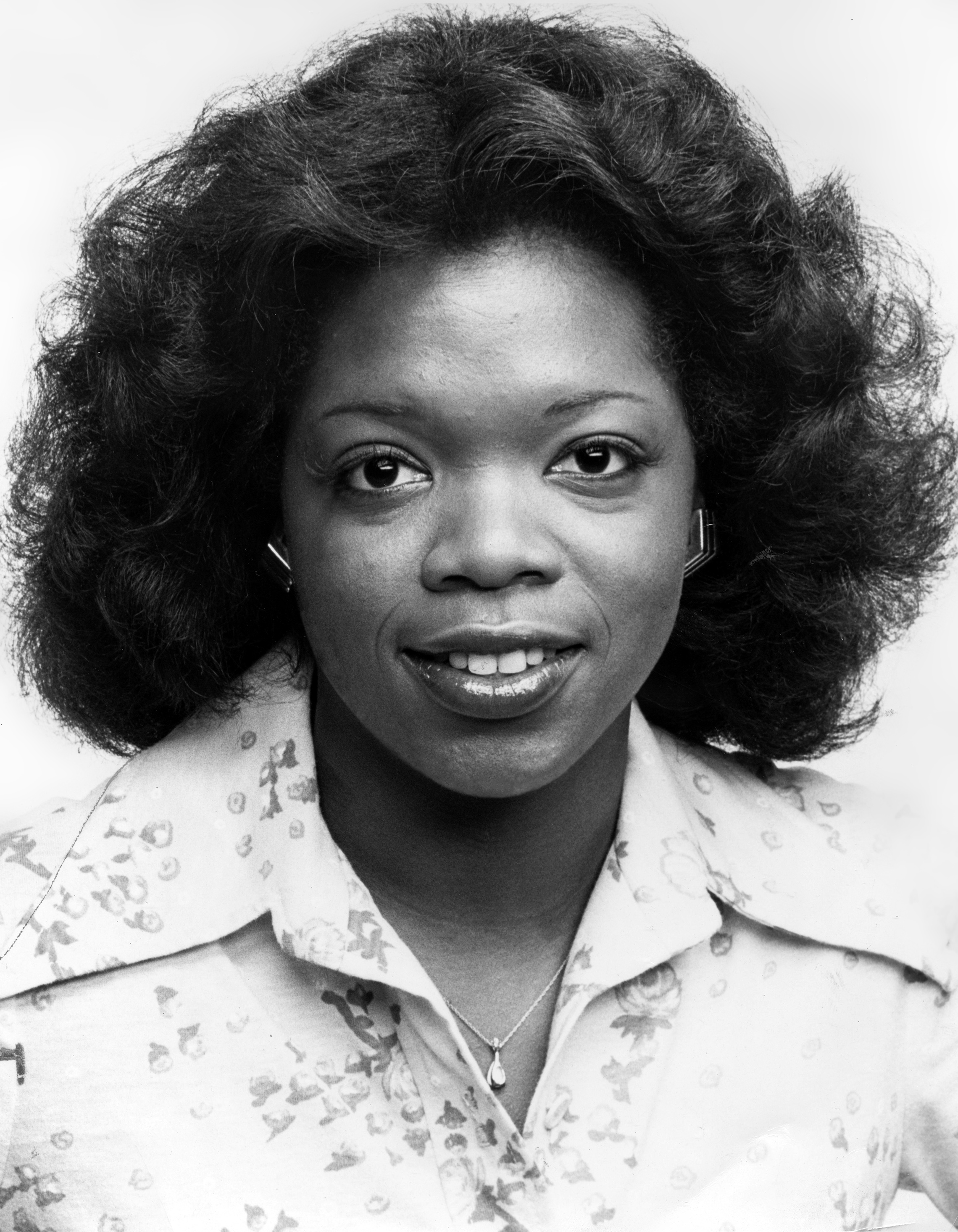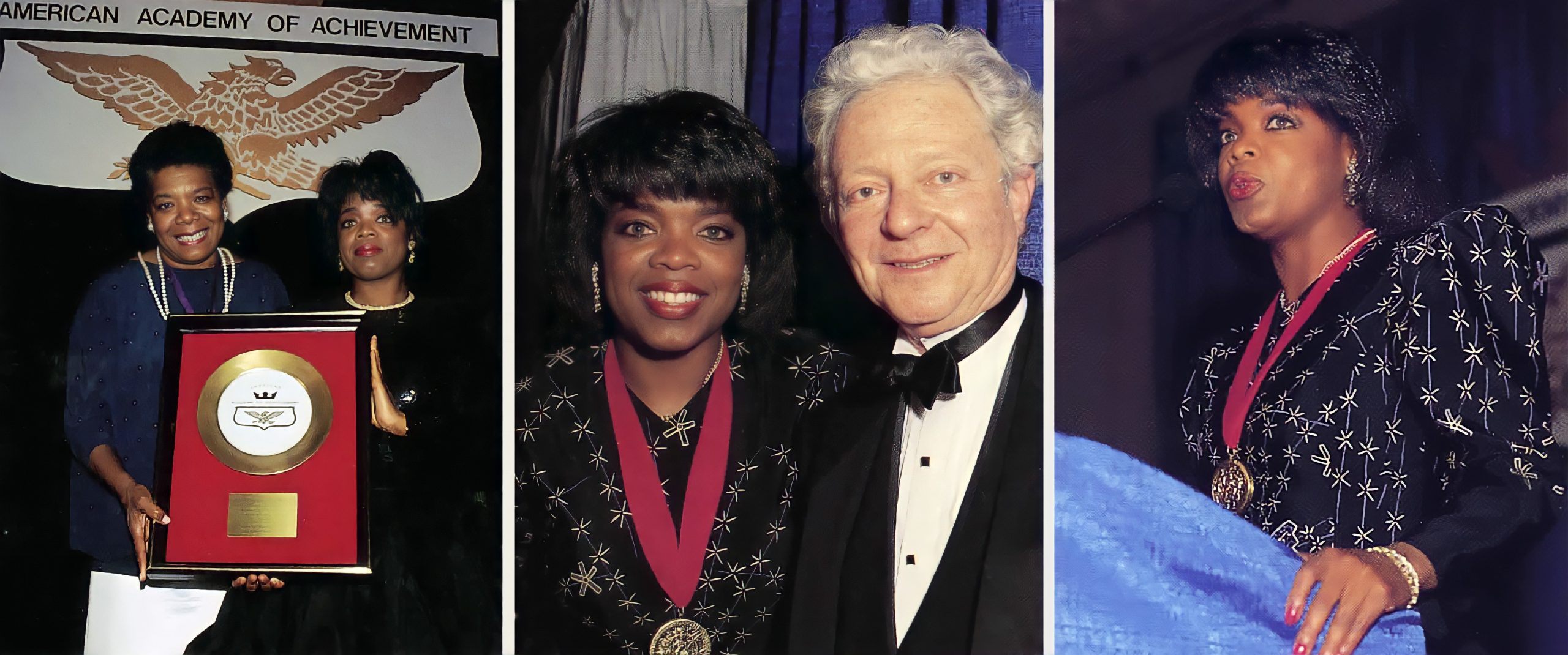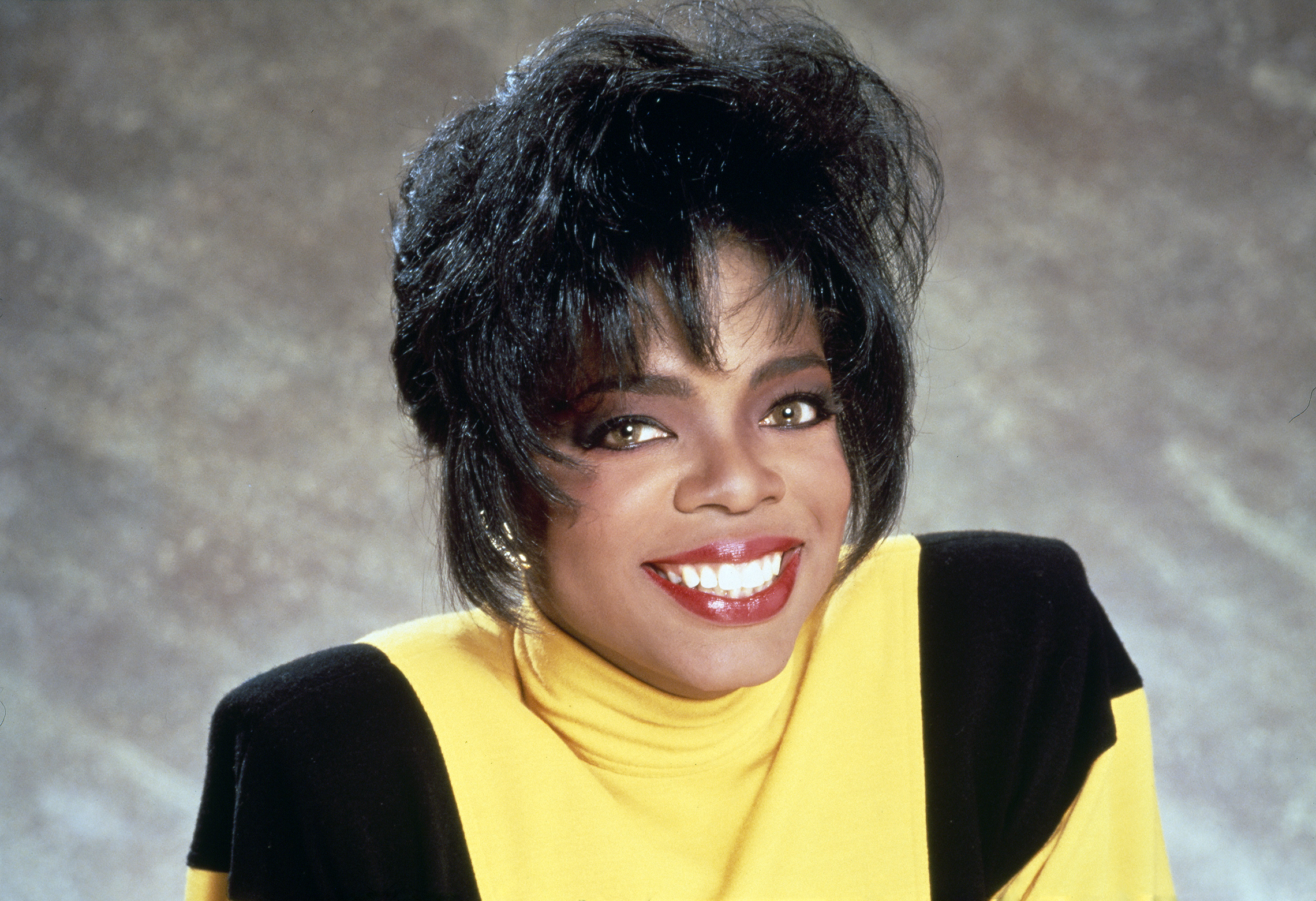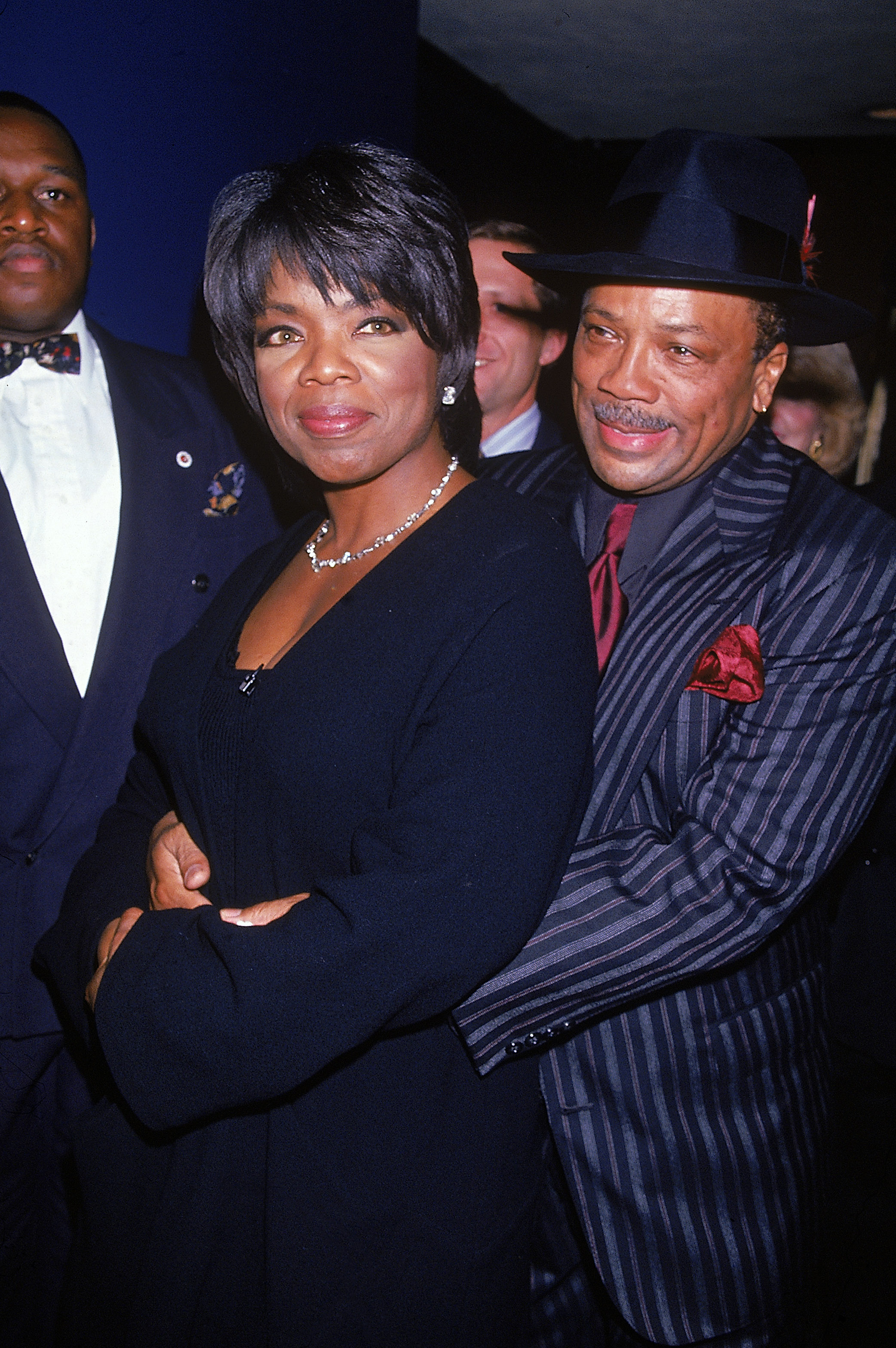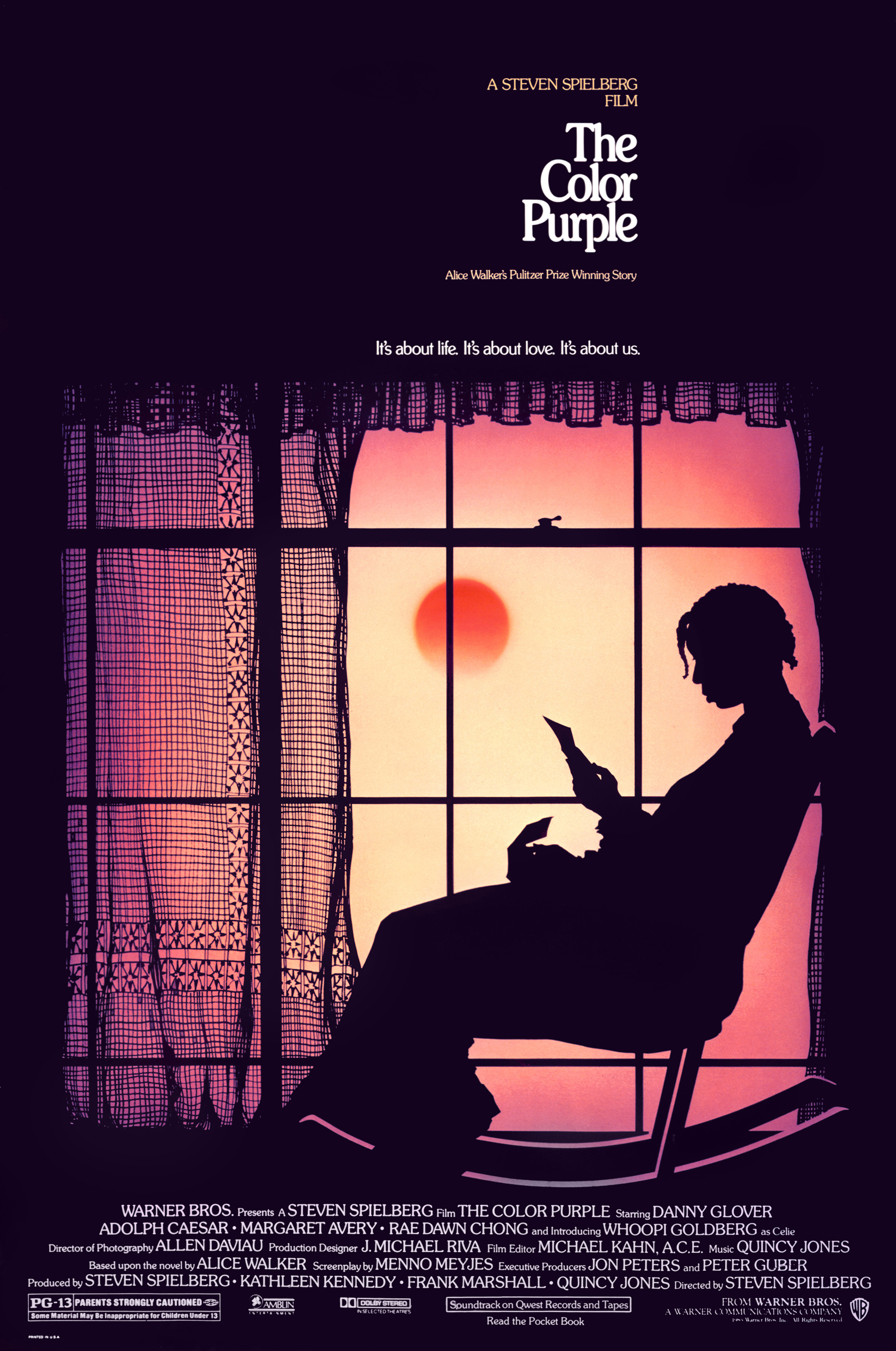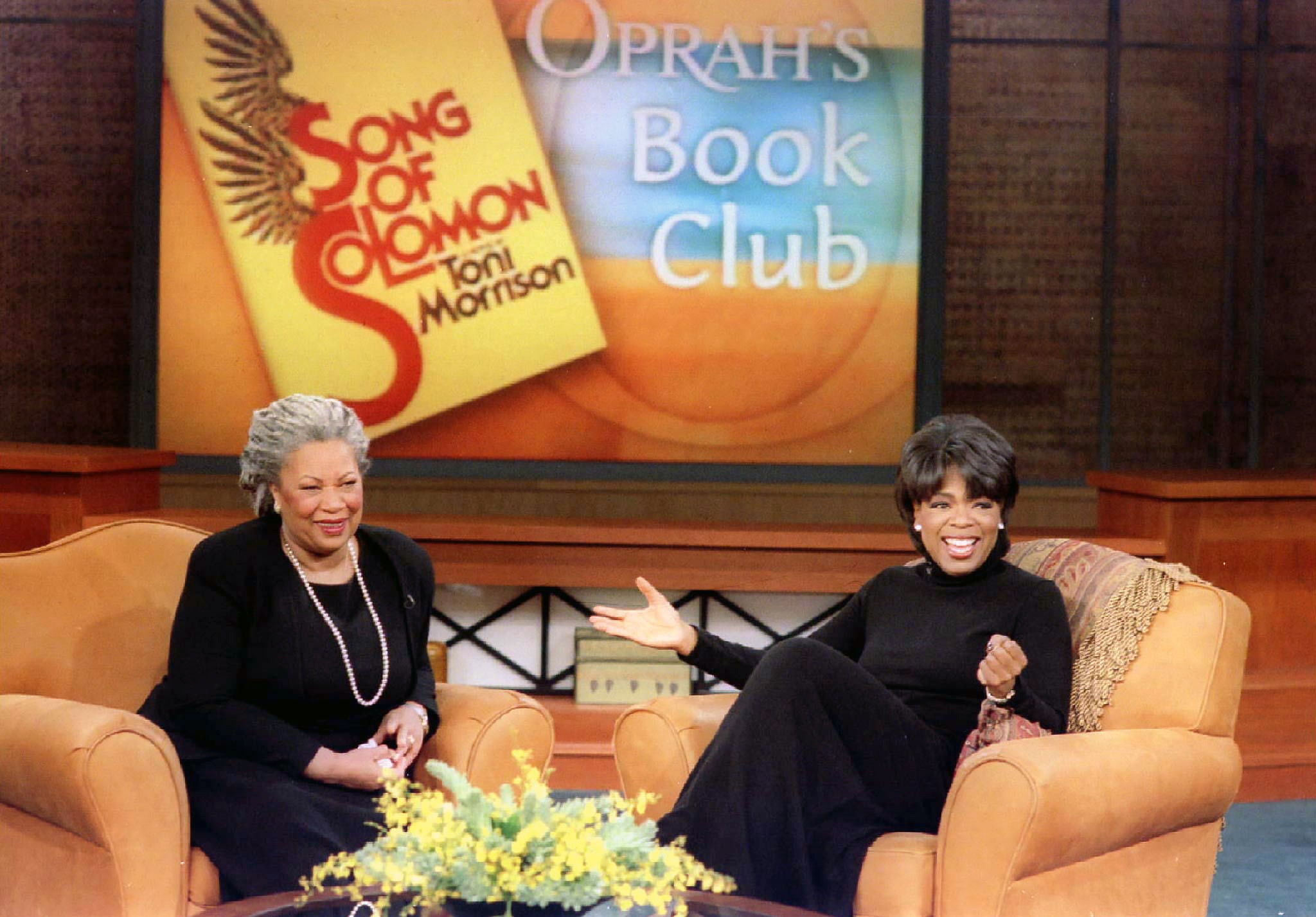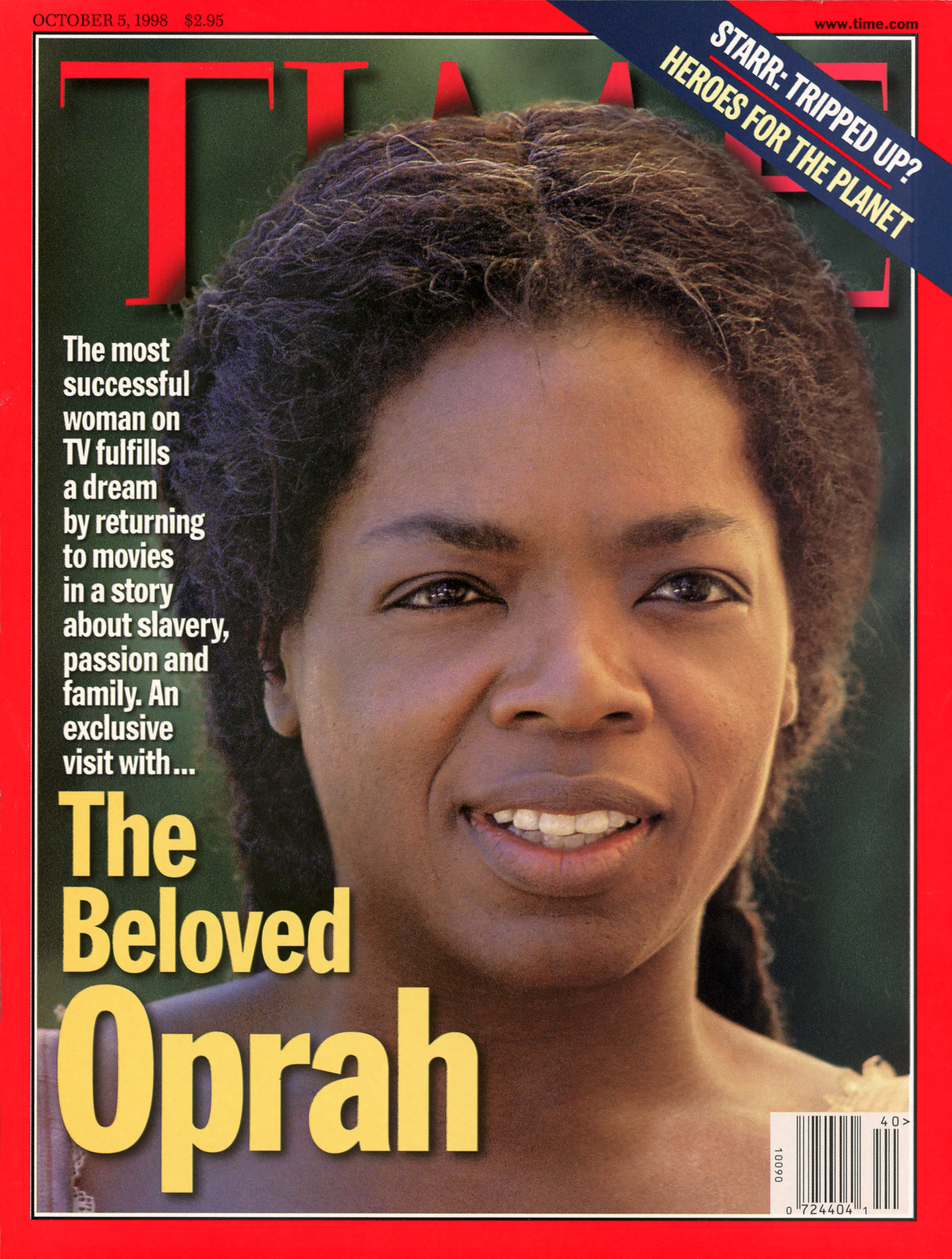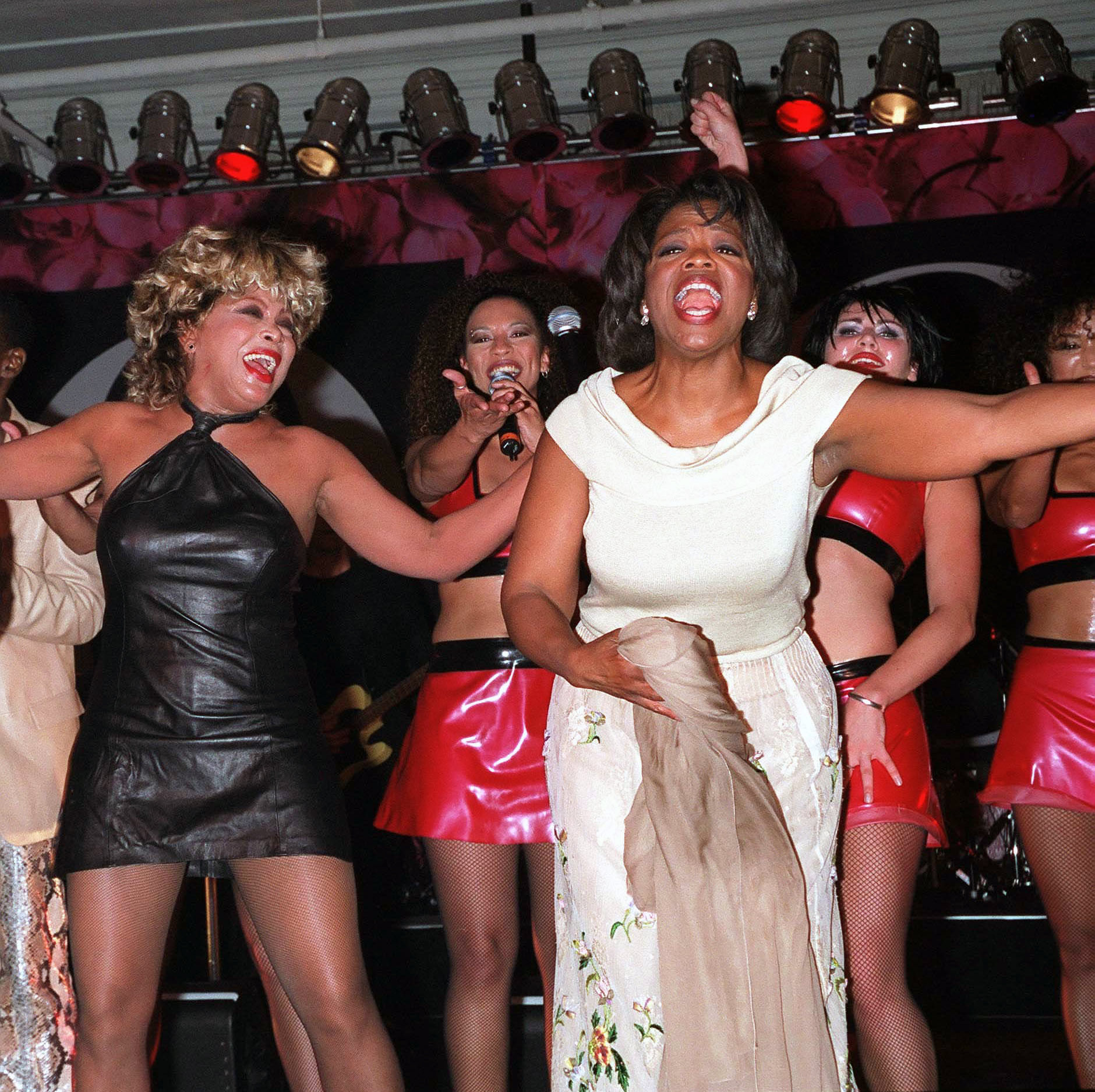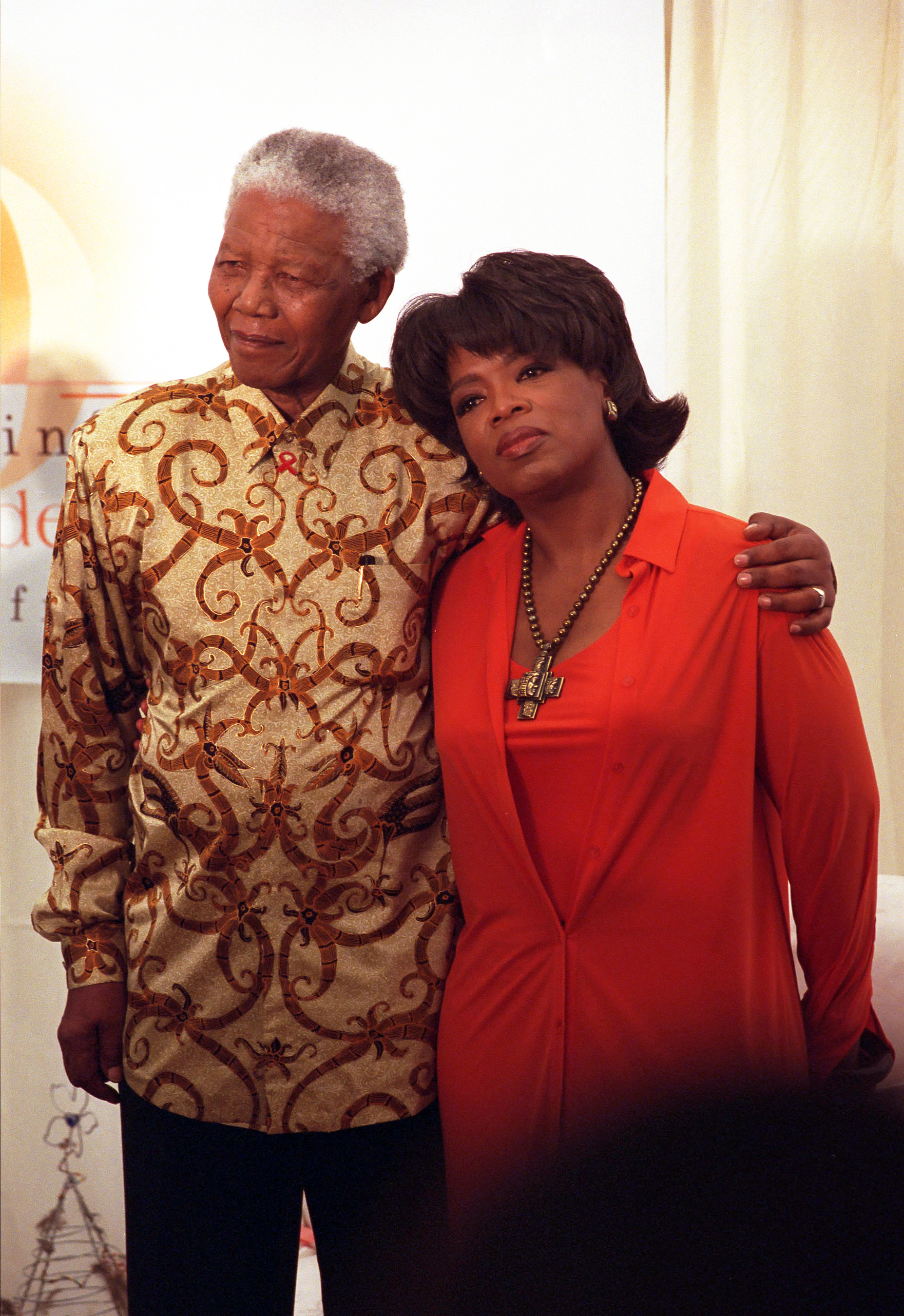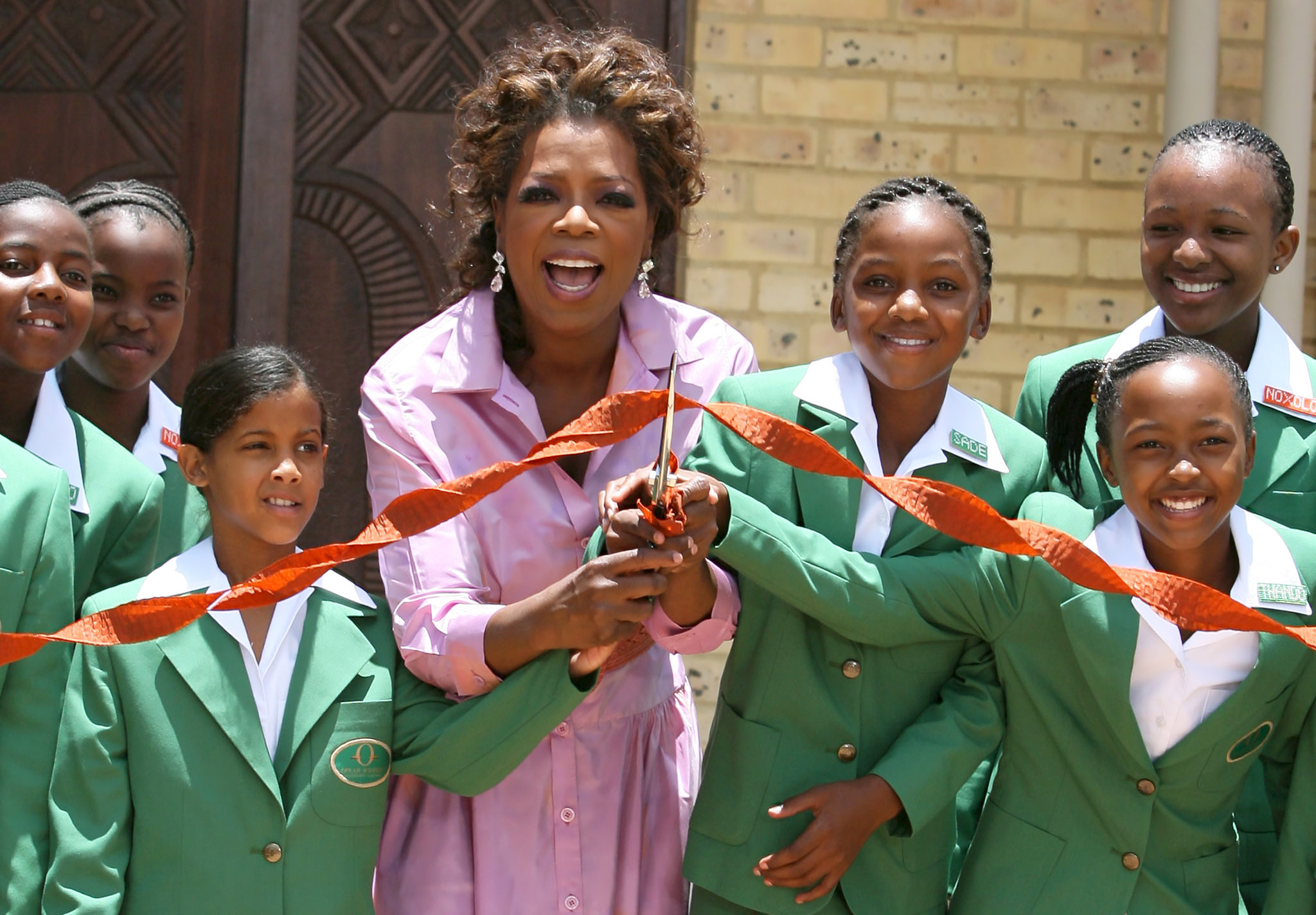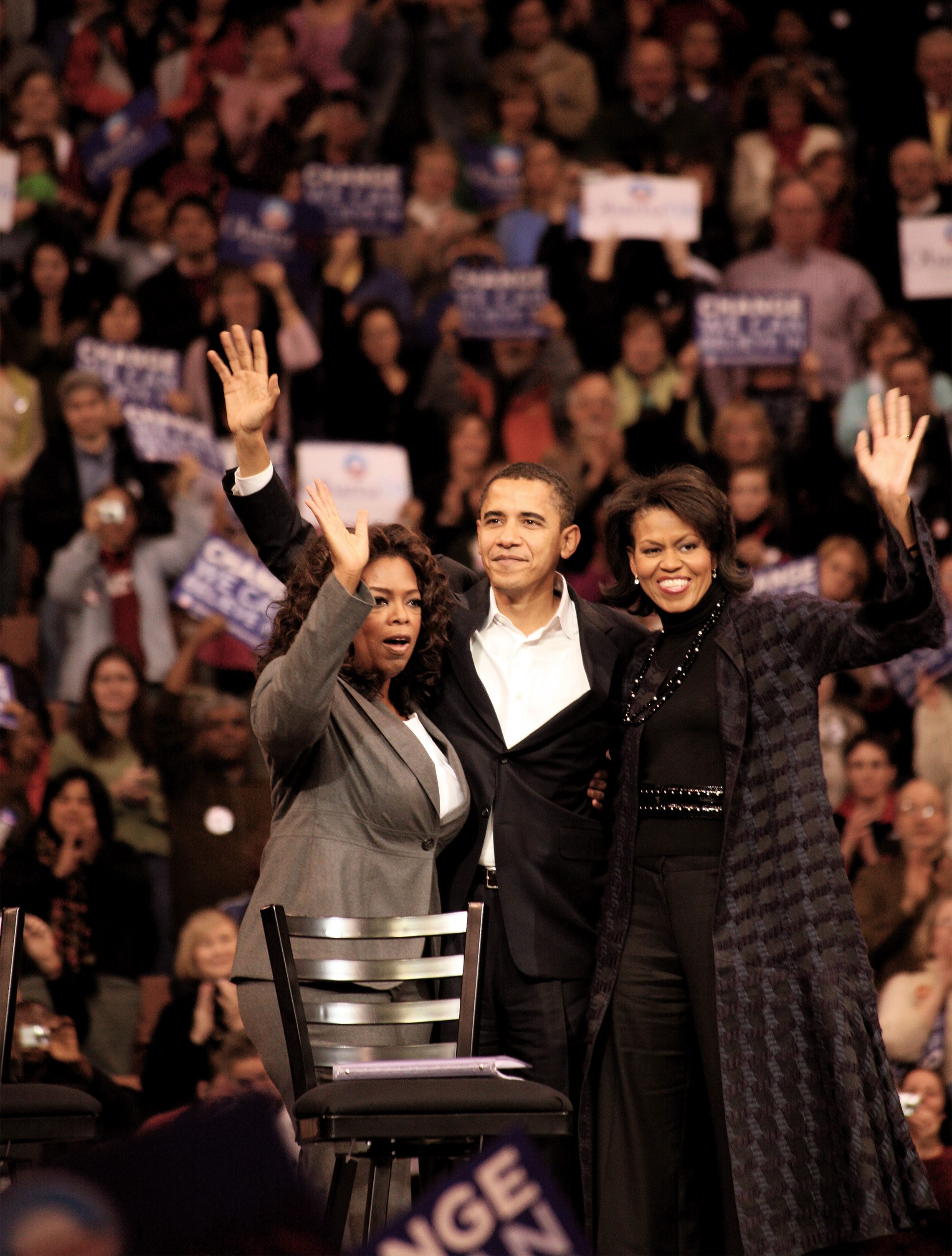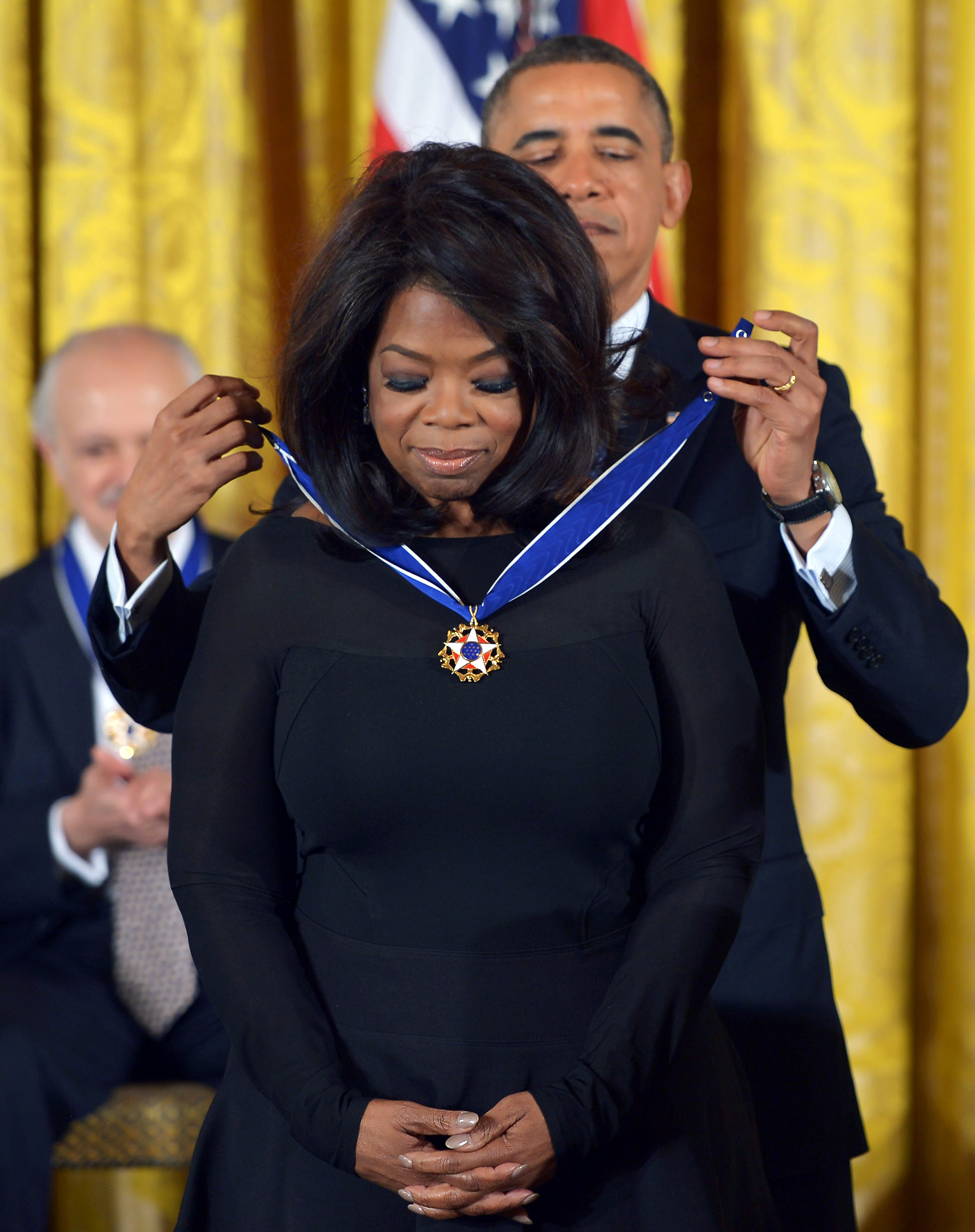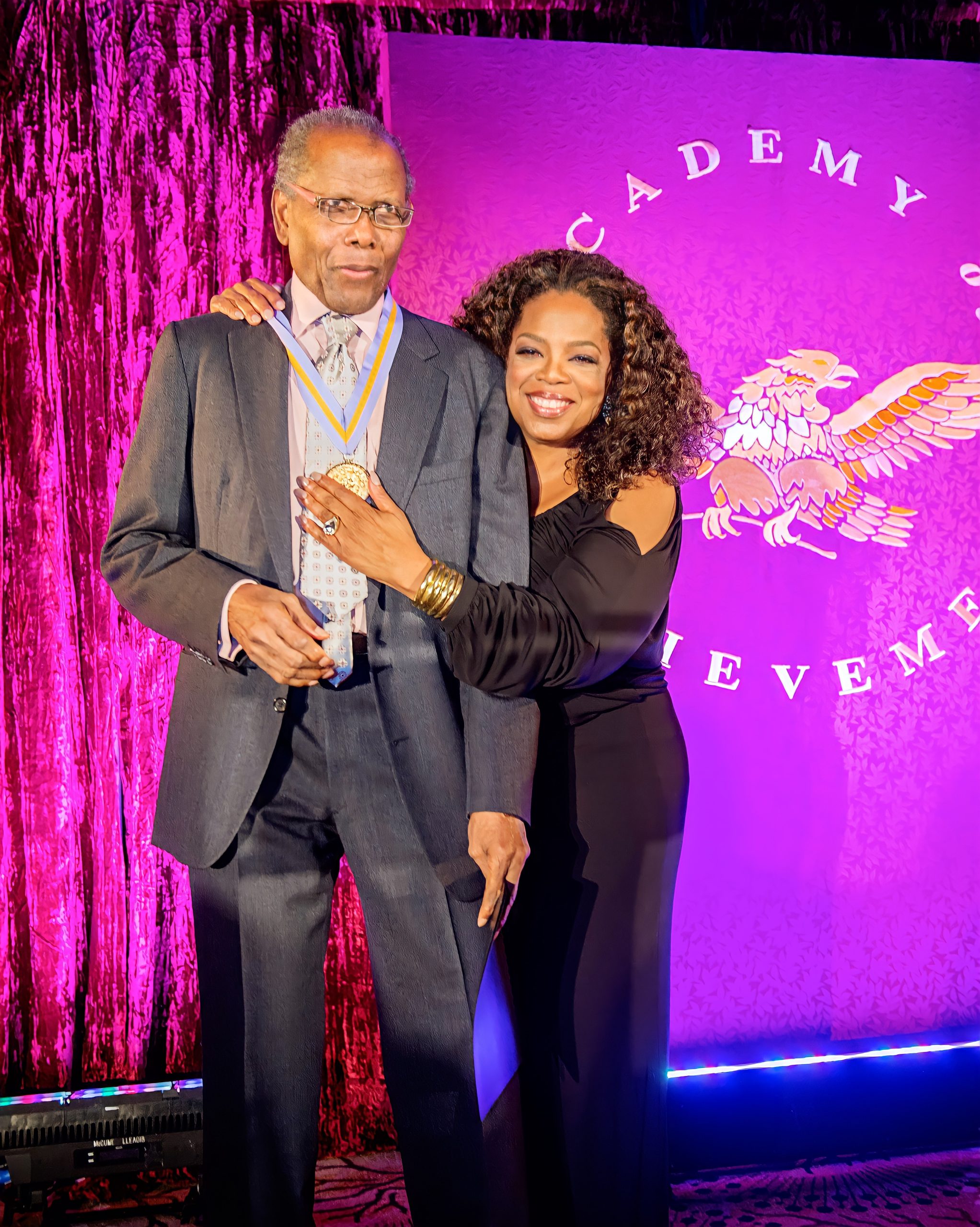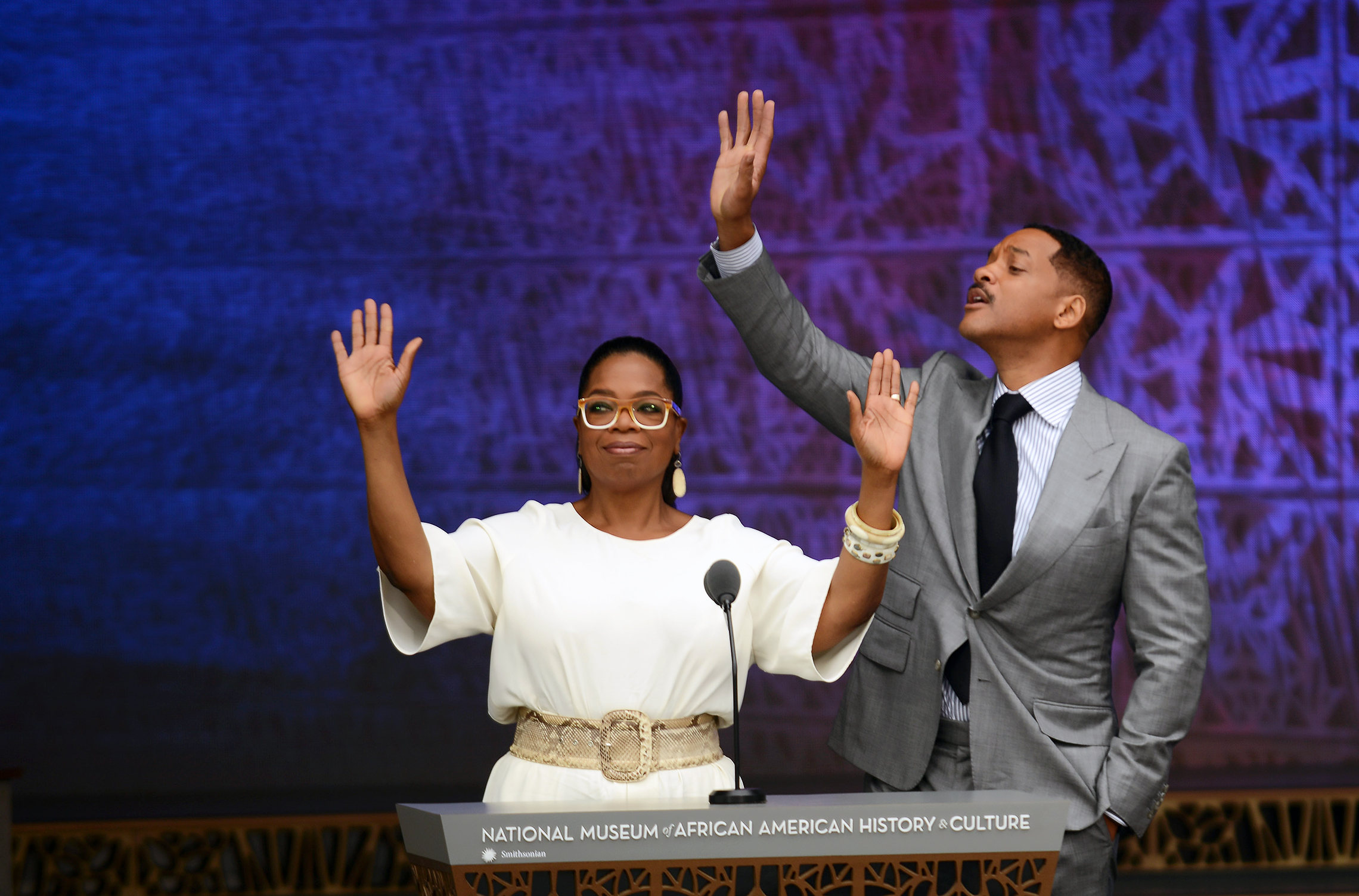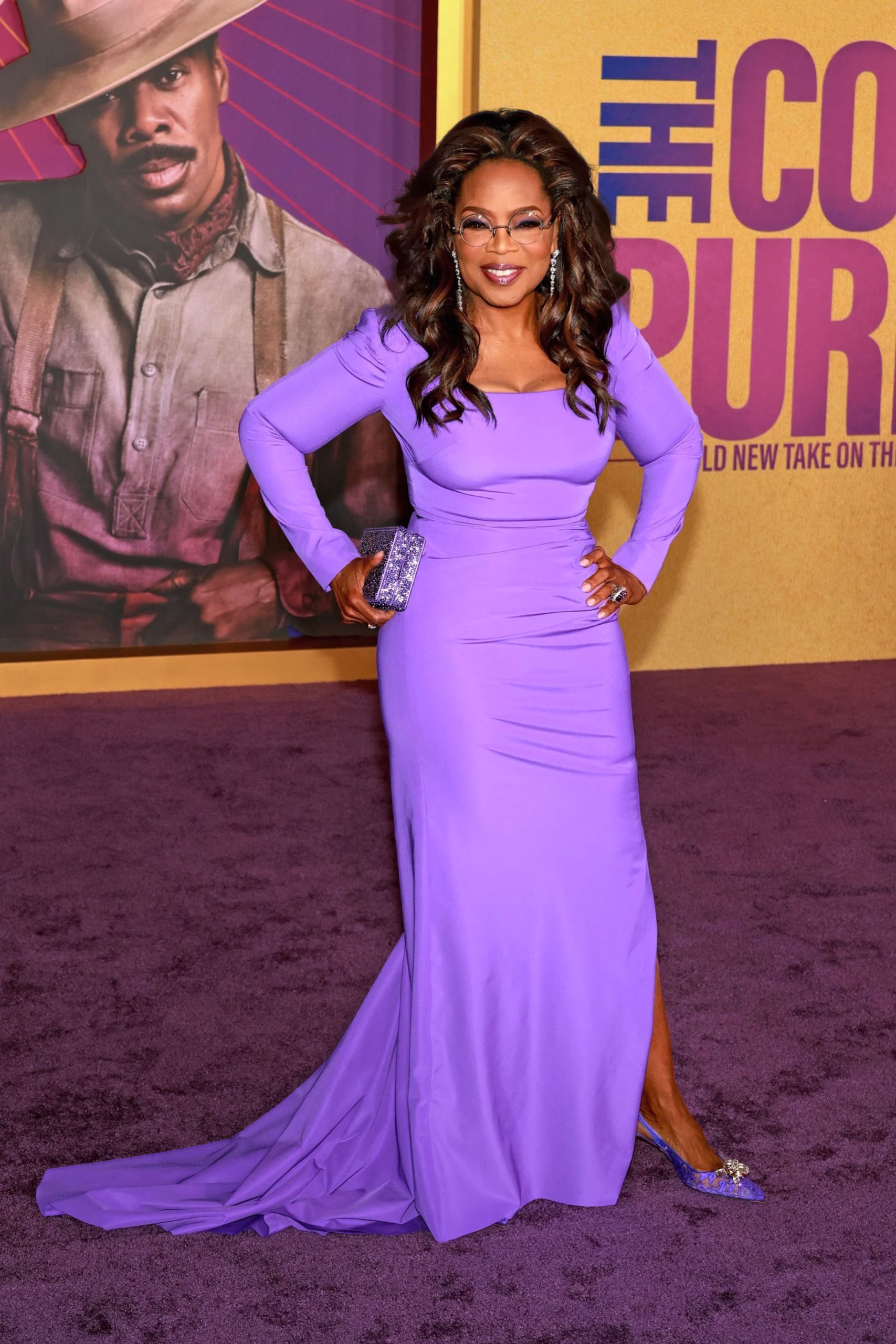As a young child, did you have any idea, any vision, of what you wanted to accomplish?
Oprah Winfrey: As a young child, I had a vision, not of what I wanted to accomplish, but I knew that my current circumstances would change. I was raised on a farm with my grandmother for the first six years of my life — I knew somehow that my life would be different and it would be better. I never had a clear cut vision of what it was I would be doing. I remember absolutely physically feeling it at around four years old. I remember standing on the back porch — it was a screened-in porch — and my grandmother was boiling clothes because, you know, at that time, we didn’t have washing machines, and so people would, you know, physically boil clothes in a great big iron pot. She was boiling clothes and poking them down. And I was watching her from the back porch, and I was four years old and I remember thinking, “My life won’t be like this. My life won’t be like this, it will be better.” And it wasn’t from a place of arrogance, it was just a place of knowing that things could be different for me somehow. I don’t know what made me think that.
Did you ever consider any other career besides talking, broadcasting, acting?
Oprah Winfrey: I always wanted to be an actress for most of my adolescent and adult life. My father didn’t want me to be, because his idea of what “an actress” was, was one of these “lewd women,” and “How are you going to take care of your life?” So I always wanted to be an actress and have taken, I think, a roundabout way to get there because I still don’t feel fulfilled as an actress. I still feel like, “Okay, once I own my own studio…” but I’m thinking, “I did all of this just to be an actress. I just want to be able to act.” For a while, I wanted to be a school teacher. In the fourth grade, Mrs. Duncan was my greatest inspiration.
In the fourth grade was when I first, I think, began to believe in myself. For the first time believed that I could do almost anything. I felt I was the queen bee. I felt I could control the world. I was going to be a missionary. I was going to Costa Rica. I used to collect money on the playground to take to church on Sundays from all the other kids. At the time, in school we had devotions, and I would sit and I would listen to everything the preacher said on Sunday and go back to school on Monday morning and beg Mrs. Duncan to please let me do devotions, just sort of repeat the sermon. So, in the fourth grade, I was called “preacher.” The kids used to poke fun at me all the time. It didn’t bother me because I was so inspired at the time.
And a lot of it was because of Mrs. Duncan, Mrs. Duncan, Mrs. Duncan. We did a show not too long ago, and I had favorite teachers on, I just broke down. First of all, it was the first time that I realized that Mrs. Duncan had a name other than Mrs. Duncan. You know, your teachers never have names. I said, sobbing, “Her name’s Mary!” I couldn’t believe it.
I understand that it’s kind of a fluke that your series is not called “The Orpah Winfrey Show.” Maybe you could just tell us the story of your name.
Oprah Winfrey: I was born, as I said, in rural Mississippi in 1954. I was born at home. There were not a lot of educated people around and my name had been chosen from the Bible. My Aunt Ida had chosen the name, but nobody really knew how to spell it, so it went down as “Orpah” on my birth certificate, but people didn’t know how to pronounce it, so they put the “P” before the “R” in every place else other than the birth certificate. On the birth certificate it is Orpah, but then it got translated to Oprah, so here we are. But that’s great because Oprah spells Harpo backwards. I don’t know what Orpah spells.
How did you come to live with your grandmother?
Oprah Winfrey: I came to live with my grandmother because I was a child born out of wedlock, and my mother moved to the North. She’s a part of that great migration to the North in the late 1950s, and I was left with my grandmother, like so many other black youngsters who were left to be taken care of by their grandmothers and grandfathers, aunts and uncles and I was one of those children. It actually probably saved my life. It is the reason why I am where I am today because my grandmother gave me the foundation for success that I was allowed to continue to build upon. My grandmother taught me to read, and that opened the door to all kinds of possibilities for me. And had I not been with my grandmother and been with my mother struggling in the North, you know, moving from apartment to apartment, I probably would not have had the foundation that I had.
So I was allowed to grow up in Mississippi for the first six years of my life and allowed to feel somewhat special because I was a precocious child; I guess by any standards now.
I was taught to read at an early age. By the time I was three, I was reciting speeches in the church. And they’d put me up on the program, and they would say, “and Little Mistress Winfrey will render a recitation,” and I would do “Jesus rose on Easter Day, Hallelujah, Hallelujah, all the angels did proclaim.” And all the sisters sitting in the front row would fan themselves and turn to my grandmother and say, “Hattie Mae, this child is gifted.” And I heard that enough that I started to believe it. Maybe I am. I didn’t even know what “gifted” meant, but I just thought it meant I was special. So anytime people came over, I’d recite. I’d recite Bible verses and poetry. By the time I was seven, I was doing “Invictus” by William Ernest Henley: “Out of the night that covers me, black as a pit from pole to pole. I thank whatever gods there be for my unconquerable soul.” And at the time, I was saying it, I didn’t know what I was talking about, but I’d do all the motions, “O-u-t of the night that covers me,” and people would say, “Whew, that child can speak!” And so that’s, you know, whatever you do a lot of, you get good at doing it. And that’s just about how this whole broadcasting career started for me.
You hear about child prodigies on the violin, but you definitely were a prodigy as a speaker. That’s very unusual.
Oprah Winfrey: I was an orator for a long time. I’ve been an orator really, basically, all of my life. Since I was three and a half, I’ve been coming up in the church speaking. I did all of James Weldon Johnson’s sermons. He has a series of seven sermons, beginning with “The Creation” and ending with “Judgment.” I used to do them for churches all over the city of Nashville. I’ve spoken at every church in Nashville at some point in my life. You sort of get known for that. Other people were known for singing; I was known for talking. By the time I entered college, what I really wanted to do was be an actress, but I got hired in television, and so I was never able to make any of the play rehearsals. Story of my life.
There was a pretty bad patch after you left your grandmother. Maybe you can talk a little bit about what that was like when you were living with your mother.
Oprah Winfrey: I was living with my mother and living under circumstances that a lot of young children have to deal with even today. We weren’t living in the projects, and if you’d asked me at the time if we were poor, I probably would have said, “no” because when you are living it and you don’t know anything else, you think that’s the way life is. And I was raped when I was nine by a cousin, and never told anybody until I was in my late twenties. Not only was I raped by a cousin, I was raped by a cousin, and then later sexually molested by a friend of the family, and then by an uncle. It was just an ongoing, continuous thing. So much so, that I started to think, you know, “This is the way life is.” And not until, I’d say, a year ago, did I release the shame for myself.
I was in the middle of an interview with a woman named Truddi Chase, who has multiple personalities and was severely abused as a child. I think it was on that day that, for the first time, I recognized that I was not to blame. I became a sexually promiscuous teenager and as a result of that got myself into a lot of trouble, and believed that I was responsible for it. It wasn’t until I was 36 years old, 36, that I connected the fact, “Oh, that’s why I was that way.” I always blamed myself. Even though, intellectually, I would say to other kids, I would speak to people and say, “Oh, the child’s never to blame. You’re never responsible for molestation in your life.” I still believed I was responsible somehow. That I was a bad girl — and just released it, in the middle… So it happened on the air, as so many things happen for me. It happened on the air in the middle of somebody else’s experience, and I thought I was going to have a breakdown on television. And I said, “Stop! Stop! You’ve got to stop rolling cameras!” And they didn’t, so I got myself through it, but it was really quite traumatic for me.
You must really be very loose and open emotionally for that to happen on the air. I’m sure there are very few people who would have a similar experience.
Oprah Winfrey: Yes, I think so. But, you know, my openness is the reason why I did not do so well as a news reporter. Because I used to go on assignment and be so open that I would say to people at fires — and they’ve lost their children — “That’s okay. You don’t have to talk to me.” Well, then you go back to the newsroom, and the news director says, “What do you mean they didn’t have to talk to you?” I’d say, “But she just lost her child, and you know I just felt so bad.” So, I didn’t do very well. I was too involved. I’d go to funerals of people and not go in. I wouldn’t want to talk to them, disturb them, cry on the air.
In reading about that period in your life, it’s obvious that there was a lot of anger in you, and you just didn’t have the proper place to put it, and so you started to rebel.
Oprah Winfrey: Now I know. I do know it now.
Has that experience made you more empathetic to your guests?
Oprah Winfrey: Well, do you know what I think? I think the lesson that you learn from allowing yourself to be abused as a child is an ongoing lesson. What I recognize is that the same thing that in some cases, that causes a child to be abused, is the same thing that causes you to be abused as an adult. It is the same thing that in your adulthood that allows you to never to be able to say “No” to people. And I realize that I was the kind of child who was always searching for love and affection and attention, and somebody to say, to look at me and say, “Yes, you are worthy.” Unfortunately, there are adults who will take advantage of that and misread your intentions. And, you know, just part of the process for me as an adult has been to come to recognize that my inability as an adult female to say “No.” I call it my disease to please as a female is the same thing that caused me to be victimized as a child. Because many times, I would get myself into situations as an adult where I didn’t want to say “No” because I didn’t want to hurt anybody’s feelings. I didn’t want to say “No” because I didn’t want anybody angry with me. I didn’t want to say “No” because I didn’t want people to think I’m not nice. And that, to me, has been the greatest lesson of my life: is to recognize that I am solely responsible for it, and not trying to please other people, not living my life to please other people, but doing what my heart says all the time. That’s the biggest lesson for me.
The other big lesson for me has been to learn: not only do you have the right to do whatever you want, you have the right to change your mind. Which has gotten me into so much trouble in my life. Like I’d say, “Oh, but, I have to go. I said I was going to do it.” And then later you think about it, and you realize “I shouldn’t be doing this, but I said I was going to do it, and I don’t want to make anybody upset.” It has taken me 37 years to figure that out, to get that straight. I think, “Oh, my goodness, if I had learned this 20 years ago, look at all the time I could have saved. Look where I could have been.”
I don’t know if men have this problem. I think men who are, for instance, abused sexually or physically, manifest outwardly in some way, that their anger and their rage takes on a different kind of direction. I think women, to a greater extent, and I know m-a-n-y, m-a-n-y women who were sexually abused, internalize it, and then allow themselves to abuse themselves later on in life. You know, you just don’t allow yourself to be all that you can be. Whereas, a man will make it more external and will be angrier. I don’t believe that anything happens without a reason. I don’t believe it. And in order to believe “That is the truth, ” you have to believe it in all circumstances.
So I say, if you are going to take responsibility for your life, then you have to take it all forms. I certainly wish that I had been the kind of child who told the first time and so, because I wasn’t the kind of child who did that, a part of my mission in life now is to encourage every other child who is abused, you tell. You tell, and if they don’t believe you, you keep telling. You tell everybody until somebody listens to you. If nothing else, that’s part of something good that came out of that experience for me, because I don’t want it to happen to another child. I don’t want another child to be afraid of saying, “This is what happened to me.”
You’re in a tremendous position to change people’s lives in that way.
Oprah Winfrey: The greatest thing about what I do, for me, is that I’m in a position to change people’s lives. It is the most incredible platform for influence that you could imagine, and it’s something that I hold in great esteem and take full responsibility for. I mean, I do every show in prayer, not down on my knees praying, but I do it before every show – a mental meditation in order to get the correct message across. Because you’re dealing with millions of people every day, and it’s very easy for something to be misinterpreted, so my intention is always, regardless of what the show is — whether it’s about sibling rivalry or wife battering or children of divorce — for people to see within each show that you are responsible for your life, that although there may be tragedy in your life, there’s always a possibility to triumph. It doesn’t matter who you are, where you come from. The ability to triumph begins with you. Always, always.
I feel very blessed. You know, as a kid, when I was growing up, especially in the third and fourth grade, I always wanted to be a minister and preach and be a missionary. And then for a while, after Mrs. Duncan’s fourth grade class, I wanted to be a fourth grade teacher. And I think, in many ways, that I have been able to fulfill all of that. I feel that my show is a ministry; we just don’t take up a collection. And I feel that it is a teaching tool, without preaching to people about it. I really do. That is my intent.
I couldn’t do the kinds of shows that I see some other people do, I just couldn’t. I’ve reached a level of maturity in this work myself. There was a time, when I first started out that, I would say, I was far more exploitative. You just put a person on for the purpose of having. I wouldn’t do that anymore. I was in the middle of a show with some white supremacists, skinheads, Ku Klux Klan members and in the middle of that show I just had a flash, I thought, “This is doing nobody any good, nobody.” And I had rationalized the show by saying, “Oh, people need to know that these kinds of people are out here.” I won’t do it anymore. I just won’t do it. There are certain things I won’t do – Satanism of any kind, any kind of Satan worship. I no longer want to give a platform to racists; I just don’t because I think no good can come of it. So if you don’t know that it exists, I’m sorry, you won’t hear it here. But that’s growth for me. I taped a show last year with a guy who was a mass murderer. He killed eighty people. I did the whole interview, and I had the families of some of the people he killed. In the middle of it, flash, I thought, “I shouldn’t be doing this; this is not going to help anybody. It’s a voyeuristic look at a serial killer, but what good is it going to do anybody?” And we didn’t air it.
Were there any books that you could remember reading when you were a kid that you loved or that influenced you?
Oprah Winfrey: Well, I loved books so much as a child. They were my outlet to the world. And I still do. People ask me, “What do you do in your spare time?” That’s what I do — I read. There are so many books. I went through a period of Lois Lenski books. She wrote Strawberry Girl, and lots of stories about these little peasant children. I went through a period where I wanted to be them. I would read the character, and whichever book I was reading, that’s who I wanted to be that week. I read a book in the third grade about Katie John, who hated boys, and she had freckles. Well Lord knows, I’m not going to have freckles, no way, no how. But I tried to put some on. And I went through my “Katie John” phase. I think the book that moved me most growing up was A Tree Grows in Brooklyn. I had a tree in my backyard, too, so I identified with her. I just thought, “Well, this is my life.” And then I discovered Maya Angelou’s I Know Why the Caged Bird Sings. Well, first of all, it was the first time I had ever encountered another woman who had been sexually abused. I couldn’t imagine, couldn’t imagine. I felt that way, too, when I read The Color Purple. I read the first page of The Color Purple, put the book down, and wept. I could not believe it, that someone had put this in writing. It was unbelievable.
That’s a very healing process.
Oprah Winfrey: Well, yes, to know that you are not the only one. Because all this time, you have carried this burden. You think nobody else in the world has been through this. Nobody else is as bad as you. And then you discover that you are not so bad after all. It’s an amazing thing.
Your father apparently had a strong influence on you when you were growing up. He was pretty strict, wasn’t he?
Oprah Winfrey: Very strict father, but I love him for it today. At the time, I thought I couldn’t imagine a human being so strict. And what was he being so strict for? He was a big influence in my life. As strict as he was, he had some concerns about me making the best of my life, and would not accept anything less than what he thought was my best.
I remember my father saying to me, “You can’t bring C’s in this house because you are not a C student. If you were a C student you could because I’m not trying to make you do or be anything that you can’t be. But you are not a C student; you are an A student. So that’s what we expect in this house.” It was just so matter of fact. And I knew he was not faking it one bit. I never even tried to bring in a C because I realized that it’s just not acceptable. When I was living with my mother, I was very rebellious. As I said, promiscuous and rebellious. I did everything I could get away with. Including faking a robbery at my house to save my glasses and my dog one time. I remember stomping the glasses in the floor and putting myself in the hospital, acting out the whole scene. I used to pull all kinds of pranks. I ran away from home. I got to my father’s house, I never told another – I used to lie to my mother all the time. I’d stay out and make up stories. I moved to my father’s house. I never told another lie because I knew it wasn’t going to be accepted. I knew, “Okay. It stops right here.”
It sounds like you realized, even though you were a kid, that you really needed some structure.
Oprah Winfrey: I needed structure and attention. I require a lot of attention. And now I get the attention of 20 million people. That’s a little too much attention. I wanted it, I got it.
Was there someone early on who gave you a big break in the business of broadcasting?
Oprah Winfrey: There are several people. It started out when I was one of two students picked from each state in 1971 to go to the White House Conference on Youth. I don’t know who sponsored it, but there was this big White House Conference on Youth, and they picked two people from each state, and from all around the world. So you were part of a whole convention with people from all over the world.
I was being interviewed by a local radio station — I was 17 at the time. There was a contest being sponsored in town called “The Miss Fire Prevention Contest.” And this guy who had interviewed me at the radio station, John Heidelberg, remembered me. But he just remembered that I had given a nice interview and I was a kid, and they needed a teenager. So he said, “What about that girl that was here last year?” Suddenly I was representing this radio station in the “Miss Fire Prevention” contest. Well, all you had to do was walk, parade around in an evening gown, answer some questions about your life. You know, it was one of those little teeny, tiny beauty pageants. Well, nobody expected me to win the pageant because we were still Negroes at the time — I’ve been colored, Negro, black, now I’m African-American.
I was the only Negro in a pageant of all red-haired girls and it’s the “Miss Fire Prevention” contest. So the Lord knows, I’m not going to win. So I was very relaxed about it. I thought, “Well, I got a new gown, and this is great.” So when it came time for the question and answer period, they asked, “What would you do if you had a million dollars?” And one girl said, “If I had a million dollars, I’d buy my mama a Frigidaire and my dad a truck.” Someone else said if they had a million dollars they’d buy their brother Bubba a motorcycle because, “He’s always wanted one,” or they’d give it to the poor. And I said, all totally relaxed because I’m not going to win anyway, “If I had a million dollars, I would be a spendin’ fool. I’m not quite sure what I would spend it on, but I would spend, spend, spend. Spendin’ fool.” Well, I ended up winning. And there was another question about what I would like to do with my life, my career. Well, everybody wanted to be a nurse, or a teacher, and I made this big speech about broadcast journalism — mainly because I had seen Barbara Walters that morning on The Today Show. So I thought, “Well, what can I be? I can’t be a nurse, can’t be a teacher because that’s what they were.” So I said I wanted to be a broadcast journalist because I believed in the truth. I was interested in proclaiming the truth to the world and all. And I won the contest. Well what a shocked Negro, me.
And that was the beginning of my broadcasting career, because when I went back to the radio station to pick up my Longines watch and my digital clock, they asked me, would I like to hear my voice on tape? They said, “Would you like to hear your voice on tape?” Just sort of as a little treat for me. “Come here, let’s listen to your voice on tape.” And so I started to read. Now, I’d been reading since I was three. They couldn’t believe how well I read. And, I was hired, there. So somebody said, “Sit down and read,” and they said, “Come hear this girl read. ” Then someone else listened, and before I knew it, there were four guys standing there listening to me read. And I was hired, seventeen years old, in radio.
At the time I was still a senior in high school, so I had to work after school. I’d finish, get there by 3:30, and I’d do on-the-air newscasts. Well, all my friends just hated me because they were cutting grass.
My sophomore year in college, someone heard me on the radio, and said, “We heard you on the radio, would you be interested in working in television?” I turned them down three times. The third time, I had a college professor. I said, “They keep calling me to be on television. And I know if I do television, I’ll never finish school.” So he said, “Don’t you know that’s why people go to school? So that somebody can keep calling them, you nit-wit!” So I went and I interviewed for the job and Chris Clark gave me the job. I interviewed for the job in television. I’d never even been behind the scenes in television. I was 19 at the time. So I decided to pretend to be Barbara Walters because that’s how I’d gotten into this in the first place. So I sat there, pretending, with Barbara in my head. Did everything I thought she would do. And I was hired. It’s amazing.
When you talk about seeing Barbara Walters on TV, it occurs to me that at that time, women in television were just beginning to really have a force. And you were dealing with both sexism and racism when you came up. How has that affected your career?
Oprah Winfrey: I would have to say that I, for the most part, have not been, as far as I know, affected. As a matter of fact, it was because of the riots of the ’70s that I think they were looking for minorities. They were trying to fulfill all of their quotas and programs. So I was hired as a token, and had to take the heat from my college classmates — I went to an all-black college — with them calling me a token. And I used to say, “Yeah, but I’m a paid token!” At the time I didn’t even know it was a pun. I’m saying, “Yeah, but they pay me.” I was very defensive about it because I’ve always had to live with the notion of other black people saying — for any amount of success that you achieve — they say, “Oh, you trying to be white. You are trying to talk white. You are trying to be white,” and so forth. Which is such a ridiculous notion to me, since you look in the mirror every morning, and you are black, there is a black face in your reflection. So I had to live with that whole thing.
It was very uncomfortable for me at first because when I first started as a broadcaster, I was 19. Very insecure. Thrown into television, pretending to be Barbara Walters, looking nothing like her. And still going to college. So I’d do all my classes in the morning, from eight o’clock to one o’clock, and in the afternoon, I’d work from two o’clock to ten o’clock and did the six o’clock news. And I would stay up and study and all that until one, two, three o’clock in the morning, and then just start the routine all over again. My classmates were so jealous of me, that I remember like, taking my little $115 paycheck – and at the time I thought it was really a lot – and trying to appease them. Anytime anybody needed any money, I was always offering, “Oh, you need ten dollars?” Or taking them out for pizza, ordering pizza for the class, things like that. That whole “disease to please.” That’s where it was the worst for me, I think, because I had wanted to be accepted by them, and could not be. First of all, I didn’t have the time. They wanted me to pledge, and I didn’t have the time to pledge. I didn’t have the time to be a part of all the other college activities, or a part of that whole lifestyle. And it was very difficult for me socially. Really one of the worst times of my life, because I was trying to fit in at school, and be a part of that culture, but also trying to build a career in television.
Your ability to get people in your audience to open up to you is astounding. To what do you attribute that?
Oprah Winfrey: My ability to get people to open up is only attributed, I think, to the fact that there is a common bond in the human spirit. We all want the same things. And I know that. I really do know that I am no different than anybody else.
One of my greatest struggles in life has been to recognize that I’m as worthy as the next guy. And I think the moment you start thinking that you are better than somebody else, you’ve lost sight of who you are. Because the truth of the matter is, we are all the same. And I know that. I really know that. And I think people sense that.
I’m telling you, I don’t see myself certainly as a celebrity, as a star, because people are so familiar with me. It’s not like with other celebrities. I’ve seen how people react to other people, and it’s not like it is to me. Basically, people say “Hey, Oprah, come on over here and sit down.” Everyday, at the end of the show, they say, “Want to go to lunch, want to come to my house? I’m fixing so and so for dinner.”
If I am sitting at a restaurant, people come up to me, sit down, bring their children — it’s just very familiar. And I think the reason people open up so much on the show is because I open up. I feel comfortable doing it. And they know that I am not going to ridicule them. I want everybody on the show, even if I disagree with them, to leave with a sense of dignity, to maintain their own dignity.
A lot of people, like critics for instance, don’t get it. There are some people who criticize the show. Now, I take criticism very seriously. I can’t say that I’m one of those people who does not read criticism because I do. And if someone criticizes something, and it strikes a nerve with me, I will then move to correct it. I have written to critics who said things that I thought were very valid.
Recently, someone criticized us for airing a show on mothers who had gone through postpartum depression and had killed their children. They were saying that the show should not have aired in the afternoon because of other children watching. I absolutely agree with that. That’s a very valid point. We should have considered that. That’s one of the things I did not think about. I’m thinking that I’m going to help all these mothers who are going through this, but that person was absolutely right. So if the criticism is valid and comes from a point of view of being well thought out, and not just to attack, I accept it. I accept it and I usually get better as a result of it. Critics have actually helped me to get better.
So you are able to deal with criticism fairly well?
Oprah Winfrey: If it’s the truth. Of all things I would say I’m a truth-seeker. I believe that, “The truth shall make you free.” I absolutely believe that. So if you are telling me the truth, I accept it and will move on it. The thing that has caused me the greatest dismay or disappointment in this life has been the fact that people can write things about you that are not true. It’s astounding to me. It’s astounding. And I don’t want to sound like one of those people who is in the public complaining about it. But it is just astounding to me that it can happen. And had it not happened to me, I would not believe somebody else complaining about it. I’d say, “Well some of it has to be true.” And that is really my only gripe about being who I am right now. That people can say things and print them, and they are not true. That you can just sit up and make up stories. It goes against everything I believe in, because I really don’t care what you print about me if it’s true.
You obviously are in the public eye in a way that most people cannot relate to. How have you adjusted to that? To the fact that when Oprah sneezes, it’s usually printed in People magazine, or whatever.
Oprah Winfrey: I don’t know about sneezing, but if she eats a piece of bacon! I think I’ve adjusted pretty well. I think I’m probably one of the most balanced people I know, to live under such a microscope like this. And I think that you have to put it all in perspective and understand who you really are. And who I really am is not some person who is just on television everyday. That is something that I do. I think it’s important for people not to look at my life, or anybody else’s life, particularly celebrities because I think adoration is unhealthy.
When you look at the list of people that students choose to admire in this country, I think that there are so many people who do such incredible things. Incredible things. Last year I met the guy who split the neutrons in two. And they do things, and you think “My God!” They do things to atoms that you can’t even pronounce. And I think, “Well, you know, wouldn’t it be wonderful if those kinds of people got publicity? Wouldn’t it be wonderful if we paid attention to some of the more humanitarian things that are going on, things that are really of value?” I think just because you can do a video, or you can dance really well, or you can sit on a talk show and you can talk to people, that is not necessarily to be held in the highest of esteem, because that isn’t what makes life meaningful. It really is not.
One of the messages that I’m getting from you is that it may be a little painful to be out there, but you have to be courageous. You have to, sometimes, go against the crowd.
Oprah Winfrey: Well, now I think it’s courageous. The interesting thing is, if you were telling me my life story, and it was about somebody else, I’d say, “Oh, how courageous.” It’s very difficult for me to give myself that credit. It’s very difficult for me to even see myself as successful because I still see myself as in the process of becoming successful. To me, “successful” is getting to the point where you are absolutely comfortable with yourself. And it does not matter how many things you have acquired.
The ability to learn to say “no” and not feel guilty about it is the greatest success I have achieved. The fact that I have, in the public’s eye, done — whatever — is fine. It’s all a growing for me. But for me to have the kind of internal strength and internal courage it takes to say, “No, I will not let you treat me this way.” is what success is all about. The same thing that prevents you from being abused as a child, and prevents you from being abused as an adult, allows you to build success for yourself. “I will not be treated this way, I demand only the best for myself.”
It’s okay if you say “no,” and then people don’t like you. That’s really okay. The important thing is how you feel about what you are doing, how you feel about yourself. It’s a long struggle, though. And I’m just hoping that in the work that I do on the show, and in the speaking that I do around the country, that young people can get the lesson sooner than I did. It’s painful because you keep repeating it over and over and over, until you get it right. And what I found is that every time you have to repeat the lesson, it gets worse. I call it, “God trying to get your attention.” The universe trying to get your attention. “Sooo we didn’t get your attention the first time! We are going to have to hit you a little harder this time.” So I’m still doing it. I’m still learning.
And it seems worse, because it gets worse. I say, the universe is always trying to get your attention. Sometimes it starts out — any major problem you encounter — as a whisper. By the time it gets to be a storm, you’ve had a pebble knock you upside the head; you’ve had a brick; you’ve had a brick wall; you’ve had a house fall down. And before you know it, you are in the eye of the storm.
But long before you are in the eye of the storm, you’ve had many warnings, like little clues. So now my goal in life is not to have to hit the eye of the storm, but to catch it in the whisper. To get it the first time. I think the thing, the one thing that has allowed me to certainly achieve both material success and spiritual success, is the ability to listen to my instinct. I call it my inner voice. It doesn’t matter what you call it — nature, instinct, higher power. It’s the ability to understand the difference between what your heart is saying and what your head is saying. I now always go with the heart. Even when my head is saying, ‘Oh, but this is the rational thing; this is really what you should do.’ I always go with that little… feeling. The feeling. I am where I am today because I have allowed myself to listen to my feelings.
How has luck affected your career?
Oprah Winfrey: I feel that luck is preparation meeting opportunity. The reason I feel so strongly about that, and it’s not just a saying for me. I was hired in television in 1973, right after the riots of ’71, ’72, and other blacks and female people were hired at the same time. People accused me of being a token at the time. It didn’t really bother me because I realized that I was going to stay there. Once I got there, I realized, nobody is getting me out of here. This is not just a phase for me. I sort of began to create my own luck. I said I knew how to edit when I didn’t. I said I knew how to report on stories. I went to my first city council meeting, I wasn’t quite sure of what to do, but I had told the news director that I did. So, then what you have to do is, be willing to admit that you know nothing. So I walked into the city council meeting and announced to everybody there, “This is my first day on the job, and I don’t know anything. Please help me because I have told the news director at Channel 5 that I know what I’m doing. Pleeeeze help me.” And they did. And from that point on all those councilmen became my friends, and I’d come in the council meeting, and they helped me out. And I realize now it was because of my willingness to say, “I don’t know it, but if you will just, you know, help me.” So that’s how I learned.
One of the biggest lessons I’ve learned recently is that when you don’t know what to do, you should do nothing until you figure out what to do because a lot of times you feel like you are pressed against the wall, and you’ve got to make a decision. You never have to do anything. Don’t know what to do? Do nothing. I wait. And that has been a big lesson: to be willing, to be still with myself, and trust myself and my higher power to help me make the right decision. And to not feel pressured. We create stress for ourselves because you feel like you have to do it. You have to. I don’t feel that anymore.
You literally bend yourself out of shape, just to try.
Oprah Winfrey: Most all the mistakes I’ve made in my life, I’ve made because I was trying to please other people. Every one of them. There is not one that I’ve made because I did something because I really wanted to do this for myself. Every mistake I’ve ever made was because I went outside of myself to do something for somebody else that I should not have. Not good. It’s a woman’s disease.
What prompted you to develop your own studio and take control of your show?
Oprah Winfrey: It was what we call a win-win-win situation, but it was a lot of trouble. Just to get to be an actress, I ended up building my own studio, because when I was shooting The Color Purple, I was not allowed the kind of freedom that was necessary to do that work. And what I really want to do is create films — for myself and other people — that uplift, enlighten, encourage, and entertain people. In order to do that, I need time. So I was working under a situation where I only had so much time to do it. As I say, to me, success is a process. There was this empty studio and old vacant lot available. And I have a partner who said to me, “You know, there is that studio available. And if you take over your own show…” Well, it just never occurred to me that could happen.
So the studio came to be as a roundabout way for me to get to be an actress. I’ve been trying to be one since I was three. And it happened as a part of an on-going process for me. It’s much easier for me to make major life, multi-million dollar decisions, than it is to decide on a carpet for my front porch. That’s the truth. I was in the K-Mart store, and I couldn’t decide between the one with the kittens and the ducks. I had them all laid out. They are $5.99 a piece. It took me longer to make the decision as to which mat I would have: “Welcome Friends” or “Welcome”or “Welcome to My House” than to make the decision to get my own studio.
I have a lawyer/manager, he and I are now partners who came to me and said, “You know, you could own your own show.” And before he said that to me, I thought, “Own my own show?” I just totally dismissed it. “How am I going to own my own show? I have a contract. What am I going to do?” He says, “You can own your own show, and there is a studio that is the old Fred Niles studio that is going to become available. It needs a lot of work…” I thought nothing of it at the time. I totally dismissed it because he was always making projections and coming up with ideas, and I just thought, “Okay, I’ll let him dream on.” Just as my speech coach had said to me many years ago. “Dream on.” Because I had a really solid contract when I was shooting The Color Purple, I didn’t have enough time to shoot it. I was begging for time because I realized that what we were doing was something very special. But, it’s very difficult to convince news people that. “oh, no it’s really not what you think.” So the studio came about as a result of me wanting more time and creativity and control for myself. I bought the studio, so that I would be able to act and do the show at the same time. So that I would be able to do two things that were very important to me.
The show is very important to me because it is a platform for being able to make a difference in people’s lives, to influence them to change for the better. I don’t want to give that up — until it’s time. And I will know when it’s time. I don’t want to be the kind of person that stays in the ring too long and gets punch-drunk from the experience. I just want to be able to do it for as long as it works. And I know it’s not going to work forever.
As long as I can be an influence and make a difference, that’s what I want to do. But I also want to act because I think that it’s very important to create work that for one, puts the black cultural experience on screen. I’ve been black, I’ve been female all my life. That’s the only thing I know. So I know that experience. I love being a woman, and I love being a black woman. I read mostly female literature because I just find that I’m drawn to it. If I’m in a book store, I’m drawn to the women writers because that’s what I know. And so I want to be able to put that on screen. I want to be able to do work that encourages, enlightens, uplifts and entertains people.
There is some work I would not do. I get offered a number of scripts, and have chosen not to do them because, fortunately, I am in the position that I don’t have to work for the sake of working. The process of the work is far more important to me, in many cases, than the end result. Once the picture is finished, that’s fine. The process of working on a show and being in the midst of a show — being right in the heart of it — is far more stimulating, fulfilling, and exciting to me than finishing the show. Then I’m on to the next thing.
You’ve become the most successful woman in entertainment today. I want to talk a little bit about your role as a businesswoman.
Oprah Winfrey: That’s so interesting to me. I read that, too. I read that! And I think, “Well what does this mean?” Like, one day, I was on the Forbes list, and someone says, “Oh, I saw you on the Forbes List.” And it was like, just another thing that had happened. It wasn’t like, “Oh, my God! I’m on the Forbes List!” What I find though, is once you make it, there is a competitive streak in you. Because now I go, “Where was I on the list?” At first I didn’t care about making it.
I remember calling up Bill Cosby saying, “Could you lend me some money so I could be number five, because I got beat out by New Kids on the Block. ” But other than that, it doesn’t register. It is very difficult for me to see myself as other people see me. Very difficult. I don’t know what that means. I don’t know what being Oprah Winfrey means to other people, from the outside. Because I still feel the same. I really do. I feel the same as I did when I was 22 and struggling. Because the struggle has taken on a different form for me. The struggle is more of an inner self struggle, trying to find the truth for myself, than it is trying to get enough money to pay my light bill.
Actually, it was easier trying to find enough money to pay my light bill than discovering what the truth of your life is all about. What other people view as successful is not what my idea of success is. And I don’t mean to belittle it at all. It’s really nice to be able to have nice things. What material success does is provide you with the ability to concentrate on other things that really matter. And that is being able to make a difference, not only in your own life, but in other people’s lives. That’s really all it’s good for because you no longer have to focus your attention on how you going to pay your car note, and whether or not you are going to sign your last name so that when the check gets there, they can send it back to you, and you can say, “Oh! Forgot to sign it!” You don’t have to play those games anymore, so you really have the time and the attention to focus on other things. And the big question for me in my life is now that I have achieved some material success, is, what do I do with it? How do I use this to make a difference?
For me, education is about the most important thing because that is what liberated me. Education is what liberated me. The ability to read saved my life. I would have been an entirely different person had I not been taught to read when I was at an early age. My entire life experience, my ability to believe in myself, and even in my darkest moments of sexual abuse and being physically abused and so forth, I knew there was another way. I knew there was a way out. I knew there was another kind of life because I’d read about it. I’d read about it. I knew there were other places and there was another way of being. And so, it saved my life, so that’s why I now focus my attention on trying to do the same thing for other people – education.
You’ve given a lot back.
Oprah Winfrey: But not enough, not enough. I don’t think you ever stop giving. I really don’t. I think it’s an on-going process. And it’s not just about being able to write a check. It’s being able to touch somebody’s life in such a way that Mrs. Duncan touched mine. It’s being able to make a child see the light in him or herself. Making someone else see that for themselves.
It’s moving to hear someone as financially successful as you, discounting the importance of the money. It’s what you do with your life.
Oprah Winfrey: I know that if I didn’t have the money, listening to somebody who had it, I’d probably not believe them. Because you can’t believe it. Because if you don’t have money, and you are just trying to make ends meet, you think that if you could just make ends meet that would make everything all right for you.
What I know is, is that if you do work that you love and work the fulfills you, the rest will come. And that, I truly believe that the reason I’ve been able to be so financially successful is because my focus has never, ever for one minute been money. And the fact that the money has come has really surprised me. I’ve been just really surprised and delighted and very pleased, and at many times overwhelmed by it. But the money has never been the focus. You know you are on the road to success if you would do your job, and not be paid for it. And I would do this job, and take on a second job to make ends meet if nobody paid me. Just for the opportunity to do it. That’s how you know you are doing the right thing.
You have people very close to you in this business that you trust, and they have also made a difference in your career.
Oprah Winfrey: I have people that I trust. I also try to surround myself with people who are smarter than I am. I think that the ability to be as good as you can be comes from understanding who you are, and what you can and cannot do. And what you can’t do is far more important than what you can do, if what you can’t do is going to keep you from flying as high as you can.
When my lawyer first came to me and said, “You can own your own show,” it literally took the ceiling off my brain because I had never even thought that high before. I never even thought that was possible. And everybody needs somebody in their life to say, “Yes, you can do it!”
I have a niece who is 15. Several years ago, I told her the same thing that my father said to me. I said, “You are too smart to get Cs.” I heard my father speaking. We were crossing the street one day, and she was talking about her grades. I said, “You are too smart to do that. You could be an A student.” And she said, “Do you really think I can?” “Oh, of course. You are such a bright person.” And she started getting As. A year later, she said, “Nobody ever told me I could.” I think that one of the most important lessons to learn is that we are all responsible for our lives. But nobody gets through this life alone. Everybody needs somebody to show them a way out, or a way up. Everybody does.
I feel best in surroundings where other people are smarter than I am because I feel like I can always learn something from it. One of the other big lessons that I’ve learned, particularly in business, is that you have a responsibility to yourself to learn as much about your business as you can. I sign every check. Although it is now tedious because the bills that come in from running and maintaining a studio — everything from Federal Express to Xerox, to every tape that needs to be repaired, and so forth — it gets to be a lot.
I have stacks and piles of checks to do, and I know that there are a lot of successful people who don’t do that. I still have a tenement mentality. I’ve been very poor in my life, and so the idea of having money and not being responsible and knowing how much money you have and keeping control of it, is not something that I personally can accept. I know that there are other people who can, but it’s just not a possibility for me. I need to know where it is. There are times when I think I want to go to the bank and say, “Show it to me.” Because just seeing it on a piece of paper — anybody can print out a piece of paper. So I watch it very carefully and try to maintain responsibility for it.
When I first started being a “business woman,” I worried about “How do you do this?” And I realized that you do this the same way as you do anything else. You be fair. You try to be honest with other people, and be fair.
You told us you sign all your own checks. You also work long hours. What kind of hours do you put in?
Oprah Winfrey: Thirteen-hour days, 15, 12. A 12-hour day is a short day for me. I feel like, after a 12-hour day, “What am I going to do with the rest of my day?” I get home, and I don’t know what to do with myself because I have all of this time left over. I don’t know what to do. So I really feel most comfortable working 14 to 16 hours because then, at least, I can go home.
Usually, I take a bubble bath. I love bubbles. Now that’s the one big luxury I have given myself. Now that I have attained some material success, I will use an entire half a bottle of bubble bath at one time. Really extravagant. And I am really particular about the kind of bubbles, too. I don’t want the kind that drip down off of your arm. Poor quality bubbles. I want the kind that cover your arm, and the bubbles stay. So I’ll go home and take a bubble bath, and usually get in bed with a pile of books. A pile of books, papers, magazines. I have to read a lot for the show.
Most of the questions come from my own natural curiosity about a particular subject. And I find I’m best in situations where I just go right off the top of my head. Right off. I ask what I want to know. And that’s what being in television for a long time — and also getting comfortable with yourself — allows you to do. If you make a mistake, you make a mistake. It’s OK to make a mistake.
It sounds like you love your work, and so in some ways it’s not really work.
Oprah Winfrey: It’s not work. Steve Martin has a joke about how some people go to the drugstore, and they sell Flair pens. And he says, in a silly voice, “And I get paid for doing this!” I feel the same way. I feel like I would do this if I didn’t get a dime for it, and that’s why you know you are doing the right thing — because it doesn’t even feel like work.
A wonderful thought to close on. Thank you for everything.
